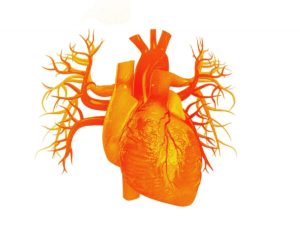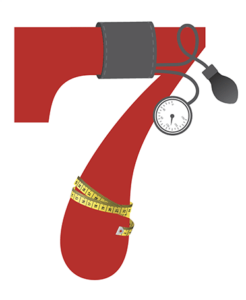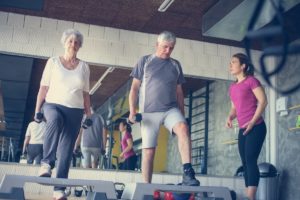Cardiovascular Disease
Debating Alcohol Consumption and Risk
In our September 2018 issue of Fitness Journal, we reported on an international study published in The Lancet that found any level of drinking above 100 grams of alcohol (3.75 ounces) per week increases heart disease risk and shortens lifespan.
Resistance Exercise and Heart Health
“People may think they need to spend a lot of time lifting weights, but just two sets of bench presses that take less than 5 minutes could be effective [in reducing heart disease risks], according to study author DC Lee, PhD, associate professor of kinesiology at Iowa State University, Ames.
Researchers analyzed data collected over 19 years from more than 12,000 male and female adult participants in The Aerobics Center Longitudinal Study conducted at the Cooper Clinic™ in Dallas.
Exercise Program Can Restore Heart Muscle Health
Good news for people who have delayed starting a training program. If the following exercise regimen is begun before age 65, studies show that the heart muscle can regain elasticity, reversing stiffening that can develop from lack of physical activity. Cardiologists from the University of Texas Southwestern Medical Center and Texas Health Resources in Dallas have been studying how to promote health and elasticity of the heart muscle.
Does Sodium Intake Concern You?
Salt: Enemy of the heart or wrongly convicted?
For years, health experts have been beating us over the head about the importance of scaling back our salt intake for the sake of our heart health. Based on research findings, the World Health Organization recommends a daily consumption of less than 2,000 milligrams of sodium—one teaspoon of salt—as a preventive measure against cardiovascular disease. The American Heart Association is even stingier with the salt shaker—just 1,500 mg of sodium a day for individuals at risk of heart disease.
What A PURE Diet Looks Like
Perhaps a heart-healthy diet has room for steak, after all.
Boosting the Brain Health of Older Adults
Exercise is good for promoting brain health. Indeed, the right kind of exercise can protect against the natural decline of brain.
Cardiovascular Fitness for Women
Cardiovascular disease, the leading cause of death in women, is a class of diseases involving the heart and blood vessels. Learn about this disease, its associated risk factors and the pertinent research developments; then consider the practical training guidelines for clients.
Healthy Habits Save Lives
A healthy lifestyle—including being physically active, eating a nutritious diet and not smoking—plays a significant role in living a longer, healthier life. This conclusion emerged from an observational study of 7,000 men and women aged 25–74 who were periodically assessed over a 35-year period. Researchers based the analysis on the American Heart Association’s definition of ideal cardiovascular health. This definition includes absence of clinical heart disease, together with positive outcomes on “Life’s Simple 7” health metrics:
Something’s Fishy With Fish Oil
Don’t like fish? Well, you might not be able to turn to the supplement aisle to get the same benefits for your heart. A Cochrane report exploring 79 randomized trials of more than 112,000 adults (both with and without heart disease) showed that increasing omega-3 intake, mainly from fish oil pills taken for at least 1 year, did not significantly prevent heart attacks, strokes or deaths in general.
Getting to the Heart of Pre-Exercise Screening
A preparticipation health screening helps trainers and prospective clients safely launch into an exercise program. When the American College of Sports Medicine updated its pre-exercise screening guidelines 3 years ago, it made one major shift: It stopped recommending the use of a tool to assess cardiovascular disease risk.
The Optimal Amount of Exercise for Heart Health
Arterial stiffness, which increases with sedentary living, is associated with higher risk of heart disease. It’s well known that exercise can help, but how much—or how little—is enough?
“While near-daily, vigorous lifelong (>25 years) endurance exercise training prevents arterial stiffening with ageing, this rigorous routine of exercise training over a lifetime is impractical for most individuals,” noted the authors of a new study, which aimed to determine the least amount of exercise necessary to reduce arterial stiffness.
Research Update: The Value of Exercise for Women’s Health
Fitness pros have a unique opportunity to take a leadership role by guiding their female clients toward a healthier, movement-oriented lifestyle. This women’s health research update discusses contemporary scientific findings you can use to educate your clients and plan up-to-date programs.
Soccer Is Medicine
Just in time for the World Cup™, researchers have found that football, or soccer as it’s known in the United States, is medicine. So go ahead and encourage clients to play it in their spare time! “Football is broad-spectrum medicine for patients with hypertension, type 2 diabetes and other lifestyle diseases,” according to Peter Krustrup, PhD, professor and head of the Sports and Health Sciences Research Unit at the University of Southern Denmark. Practicing soccer includes endurance training, high-intensity interval training and strength training, the scientists noted.
What Fitness Pros Need to Know About New Blood Pressure Guidelines
New guidelines on high blood pressure made headlines late last year because they suggest that nearly half of all Americans have hypertension—up from about one-third under previous guidelines. This is big news for fitness professionals because regular exercise is an excellent tool for regulating blood pressure. In this issue, we’ll review what you need to know about the new blood pressure guidelines.
Pillars of Functional Training for Active Aging
Healthy aging is more than the absence of disease, according to the World Health Organization (WHO): “For most older people, the maintenance of functional ability has the highest importance” (WHO 2015). Colin Milner, founder and CEO of the International Council on Active Aging in Vancouver, British Columbia, echoes these comments. “When looking at the healthy aging market today, the focus is all about function,” he says.
130/80 = High Blood Pressure
For the first time since 2003, the American College of Cardiology and the American Heart Association have produced a substantial report updating blood pressure recommendations. People with a reading of 130/80 are now classified as having high blood pressure. This is down from 140/90.
According to the ACC, this means 46% of U.S. adults will now be categorized as having hypertension.
Those in the “hypertensive crisis” category require medication intervention and immediate hospitalization if there is organ damage, according to the report.
Meditation: Part of a Heart-Healthy Lifestyle?
The American Heart Association has released a scientific statement noting that meditation has potential to reduce some heart disease risk factors and may be considered an adjunct to a heart-healthy lifestyle of good nutrition, physical activity and smoking cessation, combined with medical treatment for conditions like high cholesterol or high blood pressure.
Some Cancers Are a Weighty Issue
About 40% of cancer cases are related to overweight and obesity, according to a new report from the Centers for Disease Control and Prevention.
Mindful Movement, Meditation and High Blood Pressure
Qigong, yoga and tai chi may all be useful practices for reducing high blood pressure. And qigong, in particular, may have the most significant impact on reducing diastolic blood pressure [DBP], according to a review of studies published in Evidence-Based Complementary and Alternative Medicine (2017; article ID 9784271).
Activity Helps Heart Attack Sufferers Survive
No one plans to have a heart attack; however, should one occur, a new study has determined that an active lifestyle ups the likelihood of survival.



















